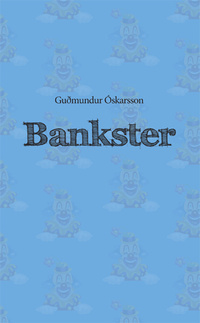Guðmundur Óskarsson
"It usually takes less than an economic crisis to cause a blow to the lives of ordinary people" says Guðmundur Óskarsson. His latest novel, Bankster, won the Icelandic Literary Prize 2009.
Bankster wins the Icelandic Literary Prize 2009
Guðmundur Óskarsson‘s latest novel Bankster was awarded the Icelandic Literary Prize 2009. Sagenhaftes-Island contacted him shortly after the results of the committee were made public. Guðmundur himself was pleasantly surprised as competition was tough in a category he shared with four other seasoned authors, among them Gyrðir Elíasson, an author who has greatly influenced Guðmundur in his writing.
A critic at Morgunblaðið informally appointed Bankster as the best 'crisis-book‘ of the year. When asked if he was worried if the book would be shadowed by the numerous books that in one way or another dealt with the economic crisis he replied that such was not the case; the angle of the novel came about soon after the events and that the crisis were in fact peripheral to the core of the novel: it often takes less than an economic collapse to cause a blow to the lives of ordinary people. He added that he‘s not too keen on the concept of 'crisis-literature‘, that it‘s an arbitrary sorting of literature; he hopes that the novel will survive the crisis and that it‘s core will earn a wider meaning after this period in Icelandic history has passed.
He continues to write alongside his day job in a bank. He confessed that the award will have some influence on his life, but the same could be said of a trivial accident like stumbling at a street curb: every event has it‘s effect, small and large.
Guðmundur added three points you should keep in mind when you win a literary prize:
- To allow oneself to be a little stressed and humble at the same time
- Thank the committee during the speech
- Thank your mother privately
A promising and independent writer
 It came as a surprise at the latest nominations for the Icelandic Literary Prize when Bankster, the third published novel by young writer Guðmundur Óskarsson, was nominated in the Literary Fiction category. Óskarsson first appeared as a writer in 2007 under the auspices of young writers' publishing house, Nykur, with his novel Vaxandi nánd – orðhviður (Increasing Proximity – a Flurry of Words), a collection of 95 short stories and short-short stories. The book was considered to be influenced by another writer who has been prominent in the field of Icelandic short story writing for many years, Gyrðir Elíasson; but although the style of the stories and the atmosphere seemed similar to those of Elíasson's works, it was obvious that a promising and independent writer was emerging. His stories chronicle the mundane, the commonplace, and illuminate those countless little details that go together to create existence in the wider context, yet their strength lies in that which is left unsaid: the antecedents and consequences that lie outside the brief morsel the reader gets to see on the pages of the book, thus creating an intangible tension in these short narratives.
It came as a surprise at the latest nominations for the Icelandic Literary Prize when Bankster, the third published novel by young writer Guðmundur Óskarsson, was nominated in the Literary Fiction category. Óskarsson first appeared as a writer in 2007 under the auspices of young writers' publishing house, Nykur, with his novel Vaxandi nánd – orðhviður (Increasing Proximity – a Flurry of Words), a collection of 95 short stories and short-short stories. The book was considered to be influenced by another writer who has been prominent in the field of Icelandic short story writing for many years, Gyrðir Elíasson; but although the style of the stories and the atmosphere seemed similar to those of Elíasson's works, it was obvious that a promising and independent writer was emerging. His stories chronicle the mundane, the commonplace, and illuminate those countless little details that go together to create existence in the wider context, yet their strength lies in that which is left unsaid: the antecedents and consequences that lie outside the brief morsel the reader gets to see on the pages of the book, thus creating an intangible tension in these short narratives.
A Hole in the Life of an Ex-Golfer
The following year Óskarsson published the novel Hola í lífi fyrrverandi golfara (A Hole in the Life of an Ex-Golfer) displaying remarkable writing talent in his first novel, according to literary critics. Morgunblaðið's Einar Falur Ingólfsson gave it four stars out of five; he said that the narrative was tightly woven and that the book was a “successful psychological thriller – even if the title indicated something more lightweight.” At the beginning of the book the narrator comes round after the previous day's somewhat hazy but eventful incidents; as the story progresses the shadows over the back story are gradually lifted and the narrator's past and his relationships with his ex-wife and childhood friend are revealed. Hola í lífi fyrrverandi golfara is about a young man's existential crisis, a hopeless love triangle that ends disastrously and upends his whole life. In this novel Óskarsson succeeds in creating an oppressive atmosphere where the narrator's angst becomes almost palpable to the reader.
Bankster
 As well as writing, Óskarsson has in recent years worked in a bank, and this has obviously been a major influence on his latest work Bankster, a genuine and personal take on the much talked-about Icelandic economic collapse. This event has one way or another, and to a greater or lesser extent, bled into much of fiction and academic writing published in Iceland in the lead-up to last Christmas. While Bankster certainly belongs to this new genre in Icelandic literature (the so-called ‘crisis' or ‘crash' literature), it neither defends the system that brought down massive consequences upon a small nation nor is it the rant of an angry young writer. It gives a very sensitive description of the emptiness that descends on Markús, a young bank employee, as he and his partner both lose their jobs, and the whole foundation of his life and future melts away in the autumn of 2008.
As well as writing, Óskarsson has in recent years worked in a bank, and this has obviously been a major influence on his latest work Bankster, a genuine and personal take on the much talked-about Icelandic economic collapse. This event has one way or another, and to a greater or lesser extent, bled into much of fiction and academic writing published in Iceland in the lead-up to last Christmas. While Bankster certainly belongs to this new genre in Icelandic literature (the so-called ‘crisis' or ‘crash' literature), it neither defends the system that brought down massive consequences upon a small nation nor is it the rant of an angry young writer. It gives a very sensitive description of the emptiness that descends on Markús, a young bank employee, as he and his partner both lose their jobs, and the whole foundation of his life and future melts away in the autumn of 2008.
A friend of Markús suggests that he start writing a diary in order to “get a grip on life during these crazy times” and stem the inevitable pessimism that follows redundancy; hence the short diary entries that give the narrative its form. The strength of Óskarsson's previous works was largely in what was left unsaid, such as the obscure situation and circumstances of the narrator in Hola í lífi fyrrverandi golfara and the unspoken context of the short stories in Vaxandi nánd; in Bankster, on the other hand, the setting is firmly based in Icelandic reality and the background to the incidents the novel springs from obvious.The book faithfully describes the existential crisis of a young man who had expected a golden future, and his helpless reaction to what is a massive blow. The economy collapsed in a shockingly short time, but Markús' downfall is slow and sure. The novel describes in bitter detail the complacency that characterised the ‘Viking raider' culture, the consequences of unfettered optimism and the unquestioning acceptance of the unstoppable advance of success and prosperity.
In his review for Morgunblaðið, critic Árni Matthíasson said the book was really excellent and picked it as ‘the best crisis book'. Víðsjá's literary critic, Gauti Kristmannsson, said it was clear that a promising writer was coming into his own: “Guðmundur Óskarsson has not merely spoken out in this novel of his. [...] He is not intimidated by form, and is prepared to experiment with a simple yet truthful narrative.” He is certainly one of the most promising young writers in Iceland today, as the Icelandic Literary Prize confirms. With three books in as many years displaying clearly the mark of a mature writer, Óskarsson's short literary career has shown him to be thoroughly deserving of the honour.
